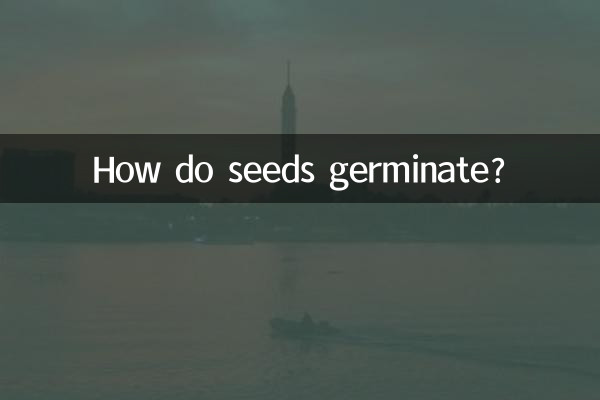How do seeds germinate?
Seed germination is a critical stage in the plant growth process and one of the most amazing phenomena in nature. This article will combine the hot topics and hot content on the Internet in the past 10 days, analyze the process, conditions and related scientific knowledge of seed germination in detail, and display key information through structured data.
1. Basic conditions for seed germination

Seed germination needs to meet the following four basic conditions:
| Conditions | Description |
|---|---|
| Moisture | The seeds swell after absorbing water, activating internal enzyme activity and starting the metabolic process. |
| temperature | Different plant seeds have different temperature requirements, generally 15-30℃ is suitable |
| oxygen | Provides essential oxygen for seed respiration |
| light | Some seeds require light stimulation to germinate |
2. Physiological process of seed germination
Seed germination is a complex physiological process, which mainly includes the following stages:
| stage | duration | Main features |
|---|---|---|
| water absorption stage | 12-24 hours | The seeds absorb water and swell, and the seed coat softens. |
| Breathing strengthens | 24-48 hours | Enhanced metabolic activity and activation of enzyme systems |
| radicle protrudes | 2-5 days | The radicle breaks through the seed coat and grows downward |
| germ growth | 3-7 days | The germ grows upward to form a seedling |
3. Factors affecting seed germination
According to recent agricultural science and technology research, factors affecting seed germination rate include:
| Influencing factors | degree of influence | Solution |
|---|---|---|
| seed vigor | high | Choose fresh, plump seeds |
| soil moisture | high | Keep the soil moist but not waterlogged |
| Sowing depth | in | Determine appropriate depth based on seed size |
| Pathogens | in | Seed disinfection treatment |
4. Latest Research Progress in Seed Germination
The scientific community has recently made some important discoveries in the field of seed germination:
1. A team from the Chinese Academy of Sciences discovered that certain plant seeds can sense microbial signals in the soil to decide whether to germinate.
2. Experiments by the United States Department of Agriculture show that sound waves of specific frequencies can promote the germination of some seeds and increase the germination rate by 15-20%.
3. Research by Wageningen University in the Netherlands has found that nanomaterial coatings can significantly improve the germination rate of seeds under drought conditions.
5. Tips for promoting seed germination in home planting
Based on recent popular discussions among gardening enthusiasts, the following practical tips are summarized:
| method | Applicable seeds | Operational points |
|---|---|---|
| Soak in warm water | hard shell seeds | Soak in warm water at 40℃ for 6-12 hours |
| Paper towel germination | small seeds | Wrap in moist paper towels to keep warm |
| Refrigerator | Seeds that need vernalization | Refrigerate at 4℃ for 1-2 weeks |
| Scratch treatment | thick shelled seeds | Slightly scratched seed coat |
6. Frequently Asked Questions about Seed Germination
Based on the frequently searched questions on the Internet in the past 10 days, the following answers have been compiled:
Q: Why do some seeds not germinate for a long time?
A: It may be that the dormant period of the seeds has not ended, the environmental conditions are not suitable, or the seeds have lost their vitality.
Q: What should I do if the seedlings lodging after germination?
A: Usually it is due to insufficient light or excessive water. Lighting should be increased and watering should be controlled.
Q: Do seeds need to be fertilized for germination?
A: It is not necessary in the early stages of germination. Start applying a small amount of fertilizer after the true leaves expand.
7. Conclusion
Seed germination is an exquisite natural process that contains the mystery of life. By understanding the scientific principles and latest research on seed germination, we can better cultivate plants and experience the magic of life. Recent research has also found that the germination behavior of seeds may be "smarter" than we thought. They can sense environmental changes and make corresponding adjustments, which provides new ideas for future agricultural development.

check the details

check the details